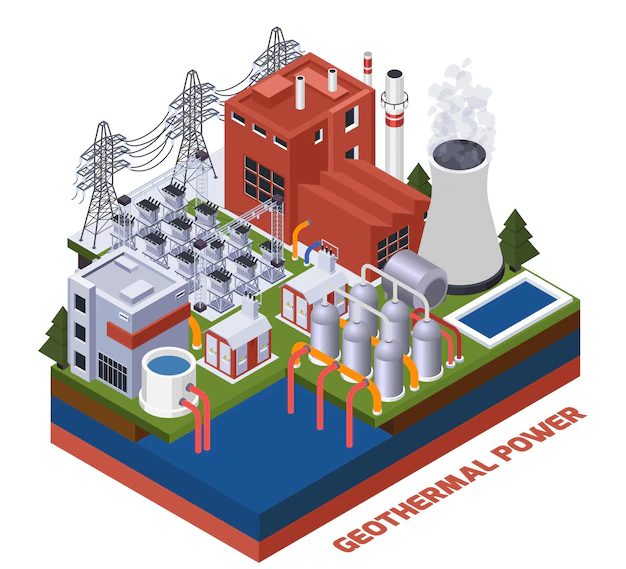Guide about the advantages of geothermal systems
We provide 24x7 transparent services
Benefits of cost effective energy solutions
Get In Touch
In the quest for sustainable and cost-effective energy solutions, businesses are increasingly turning to geothermal heating and cooling systems. These systems harness the stable temperatures beneath the Earth's surface to provide efficient and reliable climate control for commercial buildings. While the initial investment in geothermal technology can be significant, the long-term benefits in terms of energy savings, environmental impact, and system longevity make it a compelling option for forward-thinking businesses. This comprehensive guide explores the advantages of geothermal systems, how they work, and why they are a smart investment for businesses of all sizes.

Geothermal heating and cooling systems utilize the consistent temperature found just below the Earth’s surface to regulate the climate inside buildings. Unlike traditional HVAC systems that rely on external air temperatures, geothermal systems use a ground source heat pump to transfer heat between the building and the ground. This process is both highly efficient and environmentally friendly, making it an ideal choice for businesses looking to reduce their carbon footprint and operational costs.
Geothermal systems consist of three main components: the ground loop, the heat pump, and the distribution system.
The ground loop is a series of pipes buried in the ground near the building. This loop circulates a fluid, typically water or an antifreeze solution, that absorbs heat from the ground during the winter and releases heat into the ground during the summer. The ground loop can be installed horizontally or vertically, depending on the available land and geological conditions.
The heat pump is the heart of the geothermal system. It extracts heat from the ground loop and either transfers it into the building (for heating) or removes it from the building (for cooling). The heat pump works on the same principle as a refrigerator, using a refrigeration cycle to move heat from one place to another.
The distribution system delivers the heated or cooled air throughout the building. This can be done through traditional ductwork or a radiant floor heating system, depending on the design of the building and the preferences of the business owner.
Geothermal systems offer numerous benefits that make them an attractive option for businesses:
Geothermal systems are among the most energy-efficient HVAC solutions available. Because they use the stable temperatures of the Earth as a heat source or sink, they can achieve efficiencies of 300% to 500%, meaning they deliver three to five times the energy they consume. This high efficiency translates to lower energy bills and significant cost savings over time.
Geothermal systems have a minimal environmental impact compared to traditional HVAC systems. They produce no direct emissions, and because they use renewable energy from the Earth, they significantly reduce a building’s carbon footprint. Businesses that adopt geothermal technology can showcase their commitment to sustainability, which can enhance their reputation and appeal to environmentally conscious customers and stakeholders.
While the upfront cost of a geothermal system can be higher than conventional HVAC systems, the long-term savings are substantial. Geothermal systems have lower operating and maintenance costs and can last much longer—typically 20 to 25 years for the heat pump and 50+ years for the ground loop. The energy savings alone can often offset the initial investment within a few years, making geothermal a financially sound decision in the long run.
Geothermal systems provide consistent and comfortable indoor temperatures year-round. Unlike air-source heat pumps, which can struggle in extreme temperatures, geothermal systems are unaffected by outdoor weather conditions. This reliability ensures a comfortable environment for employees and customers, regardless of the season.
Many governments offer financial incentives to encourage the adoption of geothermal systems. These can include federal tax credits, state and local rebates, and utility company incentives. These financial benefits can significantly reduce the net cost of installing a geothermal system, making it an even more attractive option for businesses.
While geothermal systems offer many advantages, there are several factors that businesses need to consider before making the investment
The upfront cost of installing a geothermal system is higher than that of traditional HVAC systems. This is due to the cost of drilling or trenching for the ground loop and the price of the heat pump. However, when considering the long-term energy savings, lower maintenance costs, and available incentives, the overall financial picture often favors geothermal systems.
Not all sites are suitable for geothermal systems. The availability of land, soil composition, and local climate can all impact the feasibility of a geothermal installation. A thorough site assessment by a qualified geothermal contractor is essential to determine the best type of system for the location.
Installing a geothermal system can take longer than traditional HVAC systems due to the need for drilling or trenching. Businesses should plan for this installation time when considering geothermal, especially if the installation needs to be coordinated with other construction or renovation projects.
While geothermal systems have lower maintenance requirements than conventional HVAC systems, regular maintenance is still necessary to ensure optimal performance. This includes periodic inspections of the heat pump and ground loop, as well as cleaning and replacing air filters.
Given the higher initial cost of geothermal systems, many businesses explore various financing options to make the investment more manageable. These options include:
Businesses can finance their geothermal system through traditional loans, spreading the cost over several years. The energy savings generated by the system can help offset the loan payments, making this an attractive option for many businesses.
Some businesses opt to lease their geothermal systems, allowing them to benefit from the energy savings without the upfront investment. Leasing arrangements typically include maintenance, which can further reduce the financial burden on the business.
As mentioned earlier, government incentives can significantly reduce the cost of geothermal systems. Federal tax credits, state rebates, and local incentives can all contribute to making geothermal systems more affordable.
For businesses that cannot afford the upfront cost, PPAs offer an alternative financing model. Under a PPA, a third-party developer installs and owns the geothermal system, and the business agrees to purchase the energy generated by the system at a fixed rate. This allows businesses to benefit from geothermal energy without the need for capital investment.
Energy-efficient lighting solutions offer businesses a cost-effective and environmentally friendly way to improve their lighting systems. By conducting a lighting audit, developing a comprehensive lighting plan, and selecting the right products, businesses can achieve significant energy savings, lower maintenance costs, and create a more comfortable and productive work environment.
Geothermal heating and cooling systems represent a smart, sustainable, and financially sound investment for businesses looking to reduce energy costs and minimize their environmental impact. While the initial installation costs can be high, the long-term benefits—ranging from energy savings and environmental sustainability to enhanced comfort and reliability—make geothermal systems an attractive option for forward-thinking businesses.
As more companies prioritize sustainability and seek ways to reduce their carbon footprints, geothermal systems will likely become an increasingly popular choice in the commercial sector. By understanding the benefits and considerations of geothermal technology, businesses can make informed decisions that align with their financial goals and sustainability initiatives.
At UtilityKing, we are committed to helping businesses explore and implement renewable energy solutions like geothermal heating and cooling systems. Our team of experts can guide you through the process, from assessing site suitability to navigating financing options. Contact UtilityKing today to learn more about how we can help your business make a smart investment in geothermal energy.